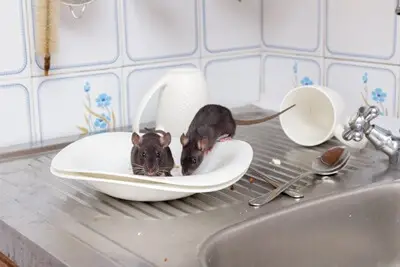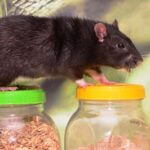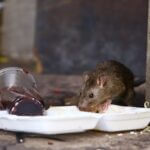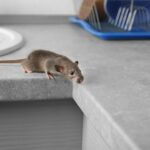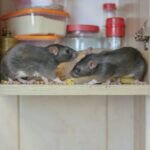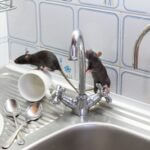Rats thrive in unsanitary conditions, so it’s natural to be concerned that you’re getting rodents because your home is dirty and poorly maintained.
However, the presence of rats doesn’t always mean that you’ve failed to clean your home. Rats will go anywhere they can access where their needs are met.
Rats are opportunistic scavengers who spend their waking hours searching for safe living conditions and resources. They’ll go anywhere they can find food, water, warmth, and shelter.
If rats can access your home, they’ll find a way to get what they need to thrive and multiply.
Don’t blame yourself for the presence of rodents in your home. Instead, focus on uncovering how rats have gained access and take the necessary steps to drive them out.
Does It Mean Your House Is Dirty If You Have Rats?
Having rats in your home isn’t conclusive evidence that your home is dirty, as even the cleanest homes can attract rats. Rats will go where their needs are met, regardless of how often you tidy your home.
Rats are opportunistic animals that seek food, water, warmth, and shelter. If rats believe your home has these features and resources, it will be attractive to them.
Almost every home has these resources and features. Even if you package and store leftover food and garbage securely, your home will remain warm and safe, and rats can gnaw through tough materials to access nutritious foods.
A small leak in a pipe or water droplets gathering in a kitchen sink can serve as a water source for rats. So, it’s unlikely that rats will need to leave your home before dehydrating.
Rats are naturally curious animals that actively explore their environment. So, if you live in an area with a large rodent population, you’ll eventually encounter rats.
If your neighbor has a rat infestation or has recently driven the rats out, they may seek a way into your home, even if you keep your house spotlessly clean. Rats merely need to find a way inside.
Why Do I Have Rats If My House Is Clean?
Rats are associated with filthy conditions, as they thrive in dirty environments with lots of feeding opportunities and hiding places. However, it’s not uncommon for rats to enter clean homes.
Tidy houses won’t be a rodents’ paradise, but there will be no shortage of places for them to nest. Once inside, these nocturnal animals will seek food and hydration while you sleep.
Here are some common reasons rats enter homes:
Location
Rats are drawn to environments with human settlements because it guarantees them access to food, water, warm conditions, safety, and shelter. However, they’ll seek to avoid drawing your attention.
Living in a sprawling urban center with a large population means you are more statistically likely to have rats. Even if you keep your house spotlessly clean, rats will find a way into your home if they believe your residence offers more than they currently have.
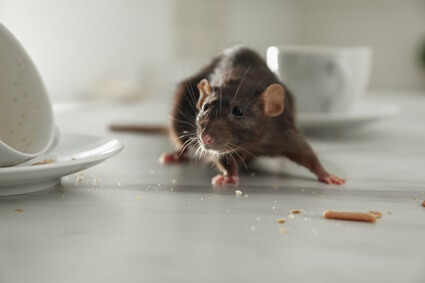
Access To The Home
Beware if your home has structural problems, such as holes or cracks in walls, unsecured vents, and gaps in the floorboards. It’s easy for rats to make their way into your home with these access points.
Keeping your home clean won’t deter rats from entering. If the entrance points aren’t sealed off to keep rats out, they’ll enter when you’re sleeping or aren’t around due to work or shopping.
According to the University of California, rodent-proofing your home is among the most effective ways of keeping rats out. So, inspect your home for potential rodent entry points and block them off.
Rats can squeeze through holes less than an inch in diameter. If a rat squeezes its head through an opening, it can enter your property.
Therefore, you should seal all openings, cracks, and crevices, regardless of how small they appear.
Unsecured Kitchen and Pantry
Rats are attracted to homes where they can find their favorite foods. They’ll look for fatty, high-calorie foods that can sustain them.
So, even if you clean up your surfaces and secure your garbage bins, unsecured food in your kitchen pantry will draw rats’ attention as they have good olfactory senses.
Unfortunately, once rats access the kitchen, they contaminate food with their saliva, urine, and droppings. This renders the food unfit for human consumption as rats carry many diseases.
Rats can access even canned food if the tin is dented or compromised. Rats have strong teeth that can gnaw and chew through many materials, including wood, plastic, and some metals.
So, ensure your food is tightly sealed in rat-proof containers and stored securely.
Greasy Surfaces
When most people clean their homes, they may fail to wipe down the grime and food spatter that gathers on the following appliances and surfaces:
- Stovetops and ovens
- Food preparation surfaces
- Splashbacks
- Sinks
- Bread bins
This can attract rats to a home, even if the rest of the property is squeaky clean.
Untidy Outdoor Spaces
If your lawn is poorly maintained, it can harbor pests, including rodents. Rats like to hide in overgrowth and trees, as these locations provide safety from predators.
Piles of wood or an unsecured compost heap provide locations for rats to nest.
The more rats in your yard, the higher the likelihood of them getting into your home. For instance, if tree overgrowth extends over your roof, rats may use it to access your home via the attic.
Prune your trees so branches are at least 15 feet from your home. Also, cut the grass regularly throughout the spring and summer to prevent rats from hiding.
Your home doesn’t necessarily need to be dirty to attract rats. The only concern of rats is whether they can find the resources they need (food, water, warmth, and shelter) inside your home.
As long as rats can gain access and find these essential resources, they’ll infest your home, even if you clean it several times per week.

